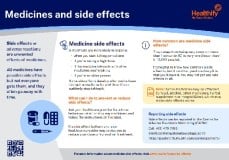If you're a frequent visitor to Healthify, why not share our site with a friend? Don't forget you can also browse Healthify without using your phone data.
Antihistamines for allergy
Key points about antihistamines for allergy
- Antihistamines are mainly used to treat allergies such as hay fever, hives and itching.
- They come in different forms, including tablets, capsules, syrups, eye drops and nasal sprays.
- Find out how to take them safely and possible side effects.

How do antihistamines work?
Antihistamines are mainly used to treat allergies such as hay fever, hives and itching. An allergy happens when your immune system overreacts to substances called allergens. Common allergens include house dust mites, grasses, pollen, pet fur, foods, some medicines, insect stings, latex and moulds. When your body reacts to allergens, it releases a chemical called histamine. Histamine causes allergy symptoms such as sneezing, itchy eyes, runny nose, and skin rashes. Antihistamines block histamine and can help to reduce allergy symptoms and make you feel more comfortable. Read more about allergies.
Antihistamines come in different forms, including tablets, capsules, syrup, eye drops and nasal sprays. Ask your pharmacist or healthcare provider about the best choice of antihistamine for you or your family member. Here is some guidance.
Antihistamine tablets, capsules and syrup
- Some can make you sleepy (called sedating antihistamines), while others cause less drowsiness or none at all (called non-sedating antihistamines).
- For allergic reactions such as hives, welts or swelling of the face, lips, eyes or tingling of the mouth, non-sedating antihistamines are preferred.
- It's recommended that sedating antihistamines should not be used to treat these reactions.
Avoid giving sedating antihistamines to children
- Sedating antihistamines are often found in cough and cold medicines. These medicines are not recommended for children under 6 years of age for coughs and colds. Read more about cough and cold medicines in children(external link).
- Do not give sedating antihistamines such as dexchlorpheniramine to children under 2 years of age for any condition.
Talk to your healthcare provider or pharmacist if you think your child needs an antihistamine; non-sedating antihistamines are usually preferred.
Eye drops
- Used to treat allergic conjunctivitis.
- Examples of antihistamine eye drops are Zaditen® and Livostin®
- Check with your pharmacist whether these are suitable for you.
- Read more about eye drops for eye allergies.
Nasal sprays
- Used to treat allergic rhinitis (hay fever).
- Can be an antihistamine spray only (such as Livostin) or can be combined with a steroid such as Dynamista.
- Note: Steroid nasal sprays are preferred for allergic rhinitis (hay fever).
- Check with your pharmacist whether these are suitable for you.
Non-sedating antihistamines are less likely to cause drowsiness. Although drowsiness is unlikely to happen with these medicines, it can still occur in some people and may affect the performance of skilled tasks such as driving. Take care until you know how these medicines affect you.
Non-sedating antihistamines are preferred over sedating antihistamines to manage signs and symptoms of allergic reactions, such as hives, welts or swelling of the face, lips, eyes, or tingling of the mouth.
Examples of non-sedating antihistamines:
- bilastine (Labixten®)
- cetirizine (Zista®, Histaclear®, Zyrtec®, Razene®, Zetop®)
- desloratadine (Aerius®)
- fexofenadine (Fexaclear®, Telfast®, Fexofast®)
- levocetirizine (Levoclear®, Levrix®)
- loratadine (Loraclear®, Claratyne®, Lora-tabs®, Lorafix®).
Sedating antihistamines can make you feel quite drowsy or sleepy. They're used for a short time, when the effect of drowsiness is helpful to the condition being treated such as for eczema flares where itchiness can cause sleep disturbance.
It's recommended that sedating antihistamines should not be used to treat allergic reactions. If used to treat a mild or moderate allergic reaction such as hives, it's hard to know whether the person is drowsy because of the sedating antihistamine or because of a drop in blood pressure due to a severe allergic reaction (anaphylaxis). Non-sedating antihistamines are preferred.
Examples of sedating antihistamines:
- dexchlorpheniramine (Polaramine®)
- doxylamine (Dozile®)
- promethazine (Phenergan®, Allersoothe®).
Take care when using sedating antihistamines
- Sedating antihistamines may affect your concentration and performance of some tasks that require you to be alert, eg, driving and operating machinery. Take care until you know how these medicines affect you.
- Avoid alcohol while you're taking sedating antihistamines as alcohol can make the drowsiness worse.
Avoid giving sedating antihistamines to children
- Sedating antihistamines are often found in cough and cold medicines. These medicines are not recommended for children under 6 years of age for coughs and colds. Read more about cough and cold medicines in children.(external link)
- Do not give sedating antihistamines such as dexchlorpheniramine to children under 2 years of age for any condition.
Talk to your healthcare provider or pharmacist if you think your child needs an antihistamine; non-sedating antihistamines are usually preferred.
How quickly antihistamines work can vary depending on the medicine and the person. Antihistamine tablets usually start to work within 30 minutes and are likely to be most effective within 1 to 2 hours.
- For allergies such as hay fever, antihistamines are more effective when taken regularly as a prevention, before symptoms occur, rather than only when you have symptoms.
- In the spring and summer months, the pollen count is generally higher and you may be in contact with the allergen often. Taking the medicine regularly will help keep your symptoms under control.
If you have some health conditions
Sedating antihistamines, in particular, may not be suitable for some people. If you have any health problems, let your healthcare provider know before you start taking any antihistamines. Here are a few examples of conditions where you should avoid sedating antihistamines:
- glaucoma
- problems with your liver or kidneys
- epilepsy
- acute porphyria (a rare metabolic disorder)
- prostate enlargement (benign prostatic hyperplasia).
If you are pregnant
If you are pregnant, always ask your healthcare provider for guidance.
- Antihistamine tablets may be recommended if allergy treatments such as steroid nasal sprays don’t work or aren’t suitable. Check which option is best with your healthcare provider.
- Most antihistamine manufacturers recommend avoiding them during pregnancy. Although there’s no clear evidence that non-sedating antihistamines harm the baby it is best to check with your healthcare provider to make sure they are needed.
- Sedating antihistamines should be avoided late in the third trimester (after 28 weeks) because they might cause side effects in newborns, such as restlessness, overexcitement, or breathing problems.
To help with allergic rhinitis (hay fever), instead of taking antihistamines, you can try the following.
- Apply Vaseline around your nostrils to catch dust and pollen.
- Breath in steam or rinse the inside of your nose with saltwater solution (saline) nasal spray or rinse to help clear a stuffy nose. Pre-prepared nasal saline solutions are available from pharmacies. Always follow reliable instructions to prepare nasal rinses, as using the wrong amount of salt can irritate the nasal membranes.
- If your symptoms are really bad, talk to your healthcare provider about the use of a steroid nasal spray such as (beclomethasone, budesonide, or fluticasone).
If you are breastfeeding
If you are breastfeeding, always ask your healthcare provider for guidance. Most antihistamines can pass into breast milk in different amounts. While they’re not known to be harmful, most manufacturers recommend that breastfeeding mothers avoid using them.
- Non-drowsy antihistamines such as loratadine and cetirizine are preferred. They should be taken at the lowest dose that works.
- If needed, sedating (drowsy) antihistamines can be used sometimes in small amounts, but the baby should be watched for side effects like sleepiness or irritability. Also, avoid sleeping in the same bed with the baby when using them.
If you're driving, cycling or operating machinery
Antihistamines can affect your concentration (how you focus or pay attention). They may slow your reaction times and cause sleepiness. This is more likely with sedating antihistamines but can sometimes happen with non-sedating antihistamines. Don't drive, cycle or operate machinery until you know how antihistamines affect you. See driving and medicines.
Increased risk of falls
Antihistamines, especially sedating antihistamines, can increase the risk of falls, especially in older adults. The risk is greater if you're taking multiple medications that affect the central nervous system such as pain medicines or in people with balance problems or chronic conditions like Parkinson’s or neuropathy. Non-sedating antihistamines are less likely to cause drowsiness or dizziness. Always start with the lowest effective dose and avoid drinking alcohol or taking other sedating medicines. Read more about medicines and falls risk.
Like all medicines, antihistamines can cause side effects, although not everyone gets them. If you're concerned about any symptoms you think might be related to your medicine, talk to your healthcare provider. The following information offers some guidance but doesn't include all possible side effects.
Common side effects
Tell your healthcare provider if you're concerned.
- Drowsiness, dizziness: Be careful when driving, cycling or using tools until you know how this medicine affects you. These effects increase the risk of falls, and injuries especially in older adults. Don't drink alcohol.
- Dry mouth, nose or throat.
- Headache.
Tell your healthcare provider immediately or phone Healthline free on 0800 611 116 if these occur
- Fast or rapid heartbeat, trouble breathing.
- Unusual weakness.
- Difficulty passing urine.
- Problems with your eyesight (blurred vision).
Read more about medicines and side effects and reporting a reaction you think might be a side effect.
References
- Antihistamines(external link) NZ Formulary
- Changes Regarding the Use of Sedating Antihistamines(external link) Medsafe, NZ, Sept 2018
How many antihistamines can I take at once?
You should only take one type of antihistamine at a time. There’s generally no need to combine different antihistamines or take more than one kind at the same time. If you feel that one antihistamine isn’t working for you, talk to your healthcare provider. It’s better to switch to a different one rather than taking multiple at once.
Can I take antihistamines if I’m pregnant?
If you're pregnant, always ask your healthcare provider for guidance. You may be able to take antihistamines but there are other ways to manage symptoms so always check with your healthcare provider to make sure they're needed.
Read more about managing hay fever symptoms above.
Can I take antihistamines if I’m breastfeeding?
If you're breastfeeding, always ask your healthcare provider for guidance. Most antihistamines can pass into breast milk in different amounts. While they’re not known to be harmful, most manufacturers recommend that breastfeeding mothers avoid using them.
Brochures

Medicines and side effects
Healthify He Puna Waiora, NZ, 2024

Health Quality and Safety Commission, NZ, 2019 English, te reo Māori
Credits: Sandra Ponen, Pharmacist, Healthify He Puna Waiora. Healthify is brought to you by Health Navigator Charitable Trust.
Reviewed by: Angela Lambie, Pharmacist, Auckland
Last reviewed:
Page last updated:





